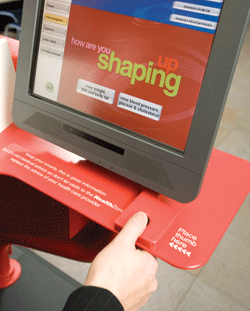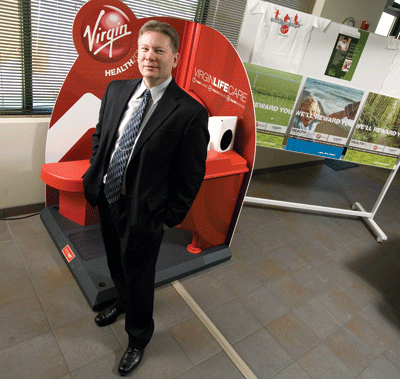No, the above title doesn’t refer to doughnut eating cops, it’s about an increasingly popular tool to reduce healthcare costs and increase workplace productivity – wellness programs.
Crain’s Chicago Business recently published the following article about wellness programs. It cites a program implemented by my associates over at The Horton Group for their own employees (I’ve published some of Horton’s materials on this blog).
To fight back against rising health care costs, employers are rewarding workers who lose beer bellies, flabby fannies
Employees at Horton Group in Orland Park have been bypassing prime parking spaces near their office’s entrance for spots deep in the lot.
It’s not that they’ve enjoyed February’s single-digit temperatures. The more they walk, the more points they earn toward up to $400 a year in free stuff at retailers like Amazon.com. Horton, an insurance brokerage, is betting the new program, which uses pedometers to tally steps, will help its 350 workers get fit – and eventually pay for itself by taming health insurance premiums.
Frustrated by traditional “wellness” programs that suffer from low participation, more employers are dangling incentives – gift cards, discounts on health premiums or even cash – to persuade workers to shed pounds. They’re giving preventative health care a second chance, viewing incentive programs as a last resort after years of shifting runaway health care costs to workers.
 “Employers have begun to realize that discounted Weight Watchers programs or health club memberships have been dismal failures,” says Larry Boress, CEO of the Midwest Business Group on Health, a coalition focusing on health care issues. “They’re finding that you need real incentives to get people engaged.”
“Employers have begun to realize that discounted Weight Watchers programs or health club memberships have been dismal failures,” says Larry Boress, CEO of the Midwest Business Group on Health, a coalition focusing on health care issues. “They’re finding that you need real incentives to get people engaged.”
Horton Group’s walking rewards program requires employees to tally daily steps using a pedometer and track progress at an office kiosk.
In a national survey of almost 150 CEOs conducted last year by PricewaterhouseCoopers, more than 80% said offering financial incentives for workers to live healthier is the most promising option for keeping a lid on health care costs. But far fewer actually offer them, partly because the return on investment is fuzzy.
 Executives must swallow hard before spending cash to goad already healthy workers to live healthier, says Dee Edington, who studies corporate wellness programs as director of the Health Management Research Center at the University of Michigan.
Executives must swallow hard before spending cash to goad already healthy workers to live healthier, says Dee Edington, who studies corporate wellness programs as director of the Health Management Research Center at the University of Michigan.
“We can’t show them definitive data yet,” he says. “But employers want to believe this will work because they’re so frustrated with rising costs.”
Employers’ health insurance costs in the Midwest have grown an average 11% annually since 2000, according to the Menlo Park, Calif.-based Kaiser Family Foundation.
BOOSTING INCENTIVES
Some companies are plowing ahead anyway, guided by the belief that enticing workers to shape up will boost productivity and keep rates in check. According to a national survey of almost 3,000 employers conducted by New York-based Mercer Health & Benefits, 19% offered such incentives last year, up from 13% in 2005.
Chicago-based Grant Thornton LLP last year began offering $600 off annual premiums for employees who filled out an online health questionnaire and then signed a pledge to exercise more and eat healthier.
“Absent that money, it probably would have ended up buried in my e-mail,” says Cincinnati-based manager Chip Von Lehman. Instead, he filled out the questionnaire and learned he was “grossly overweight” at 6 feet tall and 242 pounds.
Mr. Von Lehman, 35, says he took the pledge seriously and, also motivated by a weight-loss bet with a friend, dropped 39 pounds over four months last year by counting calories and working out on a treadmill in his basement.
At Navistar International Corp.’s truck and engine division in Warrenville, less than 40% of workers took advantage of a free health screening in past years, unimpressed by the promise of a free sweatshirt or gym bag. So the company upped the ante two years ago: Workers now get $200 off their annual premiums if they get screened and then take steps to improve their health, such as signing up with a health coach. About 90% of the 5,000 eligible employees jumped at the chance.
Kenneth Olson believes the cost of Horton Group’s rewards program will be offset by reduced medical claims.

Horton Group wants similar results from its new walking rewards program, which is offered by its health insurer, Humana Inc. The program from Boston-based Virgin Life Care Inc., a new division of billionaire Richard Branson’s Virgin conglomerate, supplies the pedometers, tracks points and coordinates rewards.
Employees earn points by walking at least 7,000 steps on a given day, roughly double the average. They can measure their weight, blood pressure and body mass index at an office kiosk and upload results to a Web site, where they track their progress on a private account.
Kenneth Olson, president of Horton’s benefits division, believes the program’s cost – roughly $6 per employee per month, or $25,000 a year – will be offset by a reduction in medical claims related to inactive lifestyles, including those for heart disease and high blood pressure. And he expects savings will be at least triple the annual cost after a few years.
“Without some proactive involvement, we’re at the mercy of the marketplace in terms of what our renewal rates are going to be,” Mr. Olson says.
For more information about work site wellness programs, feel free to contact the Horton Group’s Paul Shaheen at 312-917-8623 or by email.

Leave A Comment